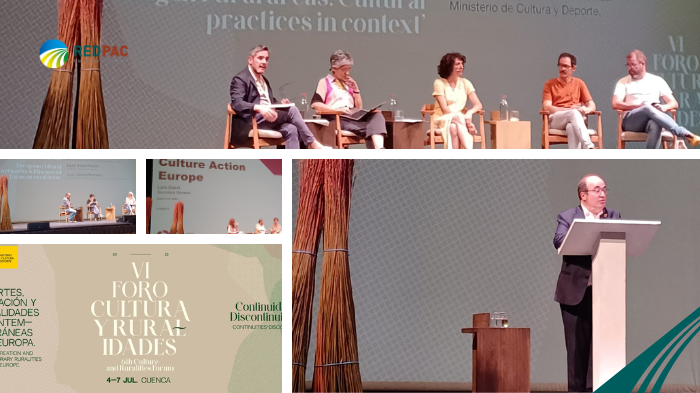
13 de July de 2023
The forum invited reflection on the new social expressions emerging in rural areas and the transition observed between the contemporary era and the era emerging from rural areas themselves.
- The sixth edition of the Culture and Ruralities Forum took place in Cuenca from July 4 to 7.
- Under the title "Continuities-Discontinuities. Arts, Creation and Contemporary Ruralities in Europe," the forum analyzed the influence of rural traditions on contemporary art.
- This edition coincided with the start of the Spanish Presidency of the Council of the European Union, bringing together 23 Offices of the "Creative Europe" programme and some 50 European cultural stakeholders.
Two of the greatest social challenges of today are our relationship with others—with the community—and our relationship with the land. However, rural areas offer an environment that enables direct contact with these two types of relationships and with almost any type of social experience. This is what makes them a kind of "laboratory" in which to observe and intuit the possible scenarios that arise for society in the present and in the future.
Thus, the VI Congress "Culture and Ruralities" (Cuenca, July 4-7), organized by the Ministry of Culture and Sport since 2017, has invited reflection on the new social expressions emerging in rural areas and the transition observed between the contemporary era and the one emerging from rural areas themselves.
The conference was opened by the Minister of Culture and Sport, Miquel Iceta, who noted that the etymological relationship between the words "culture" and "cultivate" is not trivial and that, in fact, "culture was born in the countryside."
Creative Europe
The 6th edition of the Culture and Ruralities Congress coincided with the launch of the Spanish Presidency of the Council of the European Union , which has been integrated into the development of the program. As a result, 23 offices of the Creative Europe program attended, along with approximately 50 European cultural stakeholders from the "Culture Action Europe" network . Thanks to them, advice and mentoring were provided every day of the congress, by appointment only.
Thus, European funding has been offered through two programs: the "Creative Europe" Program and the "Citizens, Equality, Rights and Values" Program , both of which are European Union programs aimed at strengthening the cultural sector and civil society project proposals, respectively.
Regarding mentoring programs, the following people attended:
- Design of an artist residency program in rural areas (Rafael Tormo).
- Innovation and cultural business models through design (Juan Lázaro).
- Marketing and financing for cultural projects (Marcel Marata).
- Legal Forms for Cultural Entrepreneurship. Intellectual Property and Copyright (Eva Moraga).
- Performing Arts Networks and Internationalization of Performing Arts Projects in Rural Europe (Ralph Lister)
Presentations
The Forum also presented initiatives of the Ministry of Culture and Sport with a European dimension, such as:
- The film series “Europe and Ruralities” .
- Expanding the mapping of cultural projects linked to rural areas in Europe.
The Culture and Ruralities Cartography is a mapping of national and international cultural actors and projects operating in rural areas . It is an open process with cultural initiatives that must be connected to the territory and the notion of rurality, as well as have a positive impact on the demographic challenge and the ecological transition.
- The English edition of the book " Thinking and Doing in Rural Areas: Cultural Practices in Context ," which includes a specific chapter devoted to mapping and analyzing artistic policies, practices, agents, and resources in rural areas at the European level.











